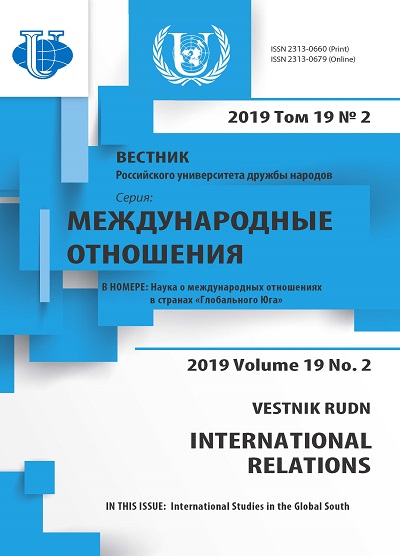Education of International Migrants’ Children: A Contribution to the Sustainable Development?
- 作者: Omelchenko E.A.1
-
隶属关系:
- Moscow State Pedagogical University
- 期: 卷 19, 编号 2 (2019): International Studies in the Global South
- 页面: 306-316
- 栏目: 国际教育合作
- URL: https://journals.rudn.ru/international-relations/article/view/21469
- DOI: https://doi.org/10.22363/2313-0660-2019-19-2-306-316
如何引用文章
全文:
详细
Due to the Agenda for Sustainable Development adopted by the UN General Assembly in 2015, the world community is to obtain a quality education and a possibility for life-long education for everybody. Children from the families of international migrants are the most vulnerable category of the population. At the end of 2017 nearly 36 million of school age children grew in the families of international migrants. The author describes problems of the education of migrants’ children in the context of the importance of achieving Sustainable Development Goals, stated by the international community. There is an analysis of the European and Russian experience in the sphere of organizing access of migrants’ children to preschool, primary and secondary education. The author has gathered concrete statistics concerning the percentage of international migrants’ children at schools in different countries. Some approaches to teaching and creating a comfortable integration-oriented environment for such children are described. Based on analyzing Russian and foreign publications, as well as on her own research experience, the author names main problems that prevent international migrants’ children from the integration into a new educational environment. Special attention is paid to the linguistic, social and cultural adaptation of such pupils. The efficiency of several concrete integration practices and the potential to apply them in Russia is searched. The author shows that there are no approaches to diagnose processes and results of integration by means of education. There is also no legislative basis for the regulation of such processes. It is shown that it is crucial for Russia to elaborate and implement the united conceptual approach to the organization of social, cultural, linguistic and psychological adaptation of children from the families of international migrants. The author proves that the education of such children is an important strategic priority and investment into the future of the whole world.
作者简介
Elena Omelchenko
Moscow State Pedagogical University
编辑信件的主要联系方式.
Email: ea.omelchenko@mpgu.su
PhD in History, director of the Center for Historical and Cultural Studies of Religion and Cross-Civilizational Relations, professor
Moscow, Russian Federation参考
- Integration of Migrants by Means of Education: Moscow Experience. (2008). Moscow: Etnosfera publ. (In Russian).
- Jacobs, D. (2013). The Educational Integration of Migrants. What Is the Role of Sending Society Actors and Is There a Transnational Educational Field? INTERACT Research Report, March. URL: http://www.interact-project.eu/ docs/publications/Research%20Report/INTERACT-RR-2013-03.pdf (accessed: 24.12.2018).
- Lomakina, I.S. (2015). Problems of Multiculturalism in the Sphere of Education in the European Union. Pedagogics, 2, 118—126. (In Russian).
- Lumayag, L.A. (2016). A Question of Access: Education Needs of Undocumented Children in Malaysia. Asian Studies Review, 40 (2), 192—210. DOI: https://doi.org/10.1080/10357823.2016.1158238.
- Musin, D.A. (2010). Ethno-Cultural Policy in Permskij Kraj: the Experience of Harmonization of Inter-Ethnic Relations. Ars Administrandi, 2, 97—113. (In Russian).
- Omelchenko, E.A. (2018). Integration of Migrants by Means of Education: Russian and World Experience. Moscow: Etnosfera publ. (In Russian).
- Petrishchev, V.I. (2014). Social and Cultural Adaptation of Children from Migrants’ Families: the Reason of Success in Teaching Some Migrants and Non-Success in Teaching Others. In: Social and Cultural Adaptation and Integration of Migrant Youth to a Multicultural Educational Environment. Problems, Searches, Solutions. Krasnoyarsk: KGPU publ. (In Russian).
- Problems of Defending the Rights of Children Who Do Not Have Russian Citizen in Moscow. (2018). Moscow. URL: https://is.gd/oe30xS (accessed: 27.01.2018). (In Russian).
- Ridel, S. (2007). Muslims in the European Union. Comparing National Concepts of Integration. Bulletin of Analytics, 2, 103—115. (In Russian).
- Schnell, P. (2014). Education Mobility of Second-Generation Turks. IMISCOE Research Series. URL: https://www.imiscoe.org/ publications/library/2-imiscoe-research-series/6-educational-mobility-of-second-generation-turks (accessed: 24.12.2018).
- Taguma, M., Kim, M., Brink, S. & Teltemann, J. (2010). Sweden. OECD Reviews of Migrant Education. URL: https://www.oecd.org/sweden/44862803.pdf (accessed: 13.11.2018).
- Teacher Education for Inclusion (2010). International Literature Review. European Agency for Development in Special Needs Education. URL: https://www.european-agency.org/sites/default/files/TE4I-Literature-Review.pdf (accessed: 13.01.2019).
- Tyuryukanova, E.V., Zajonchkovskaya, Zh.A., Karachurina, L.B., Mkrtchyan, N.V., Poletaev, D.V. & Florinskaya, Yu.F. (2011). Migrant Women from the CIS Countries in Russia. Moscow: MAX Press publ. (In Russian).
- Usha, T.Yu. (2014). The Experience of Linguistic Adaptation of Migrants’ Children as a Reflection of Migration Policy. News of Hertzen Russian State Pedagogical University, 170, 26—34. (In Russian).
- Vulfson, B.L. (2015). Acculturation of Migrants in the European Educational Space. Moscow: MPSU publ. (In Russian).
- Waslin, M. (2016). Undocumented Children Face These Challenges in Accessing Public Education. URL: http://immigrationimpact.com/2016/04/14/undocumented-children-public-education/ (accessed: 24.12.2018).
- Zborovskij, G.E., Shuklina, E.A. & Zasypkin, V.P. (2015). Educational and Adaptation Practices of Labour Migrants and Their Children (based on the data of the research in Khanty-Mansijsk Autonomous Region). Sociology of Education, 3, 70—83. (In Russian).
- Zhivotovskaya, I.G. (2006). Immigrants in Italy: Problems of Integration. In: Actual Problems of Europe. Immigrants in Europe. Problems of Social and Cultural Adaptation. Collection of scientific articles of the Russian Academy of Science. Moscow: INION publ. (In Russian).








